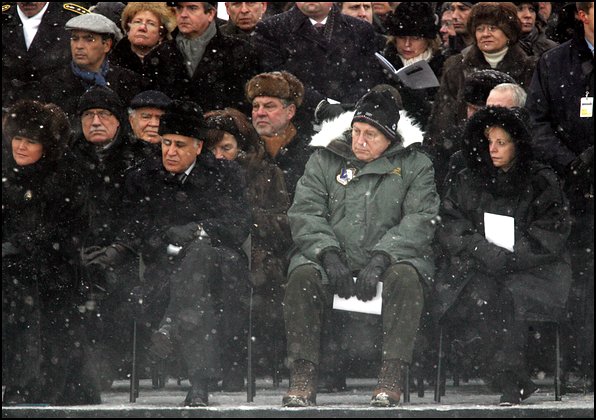There’s Something About Dick Cheney
A version of this blog post appeared on the Next Right on July 13, 2009.
In his Pulitzer-winning biography, Angler: The Cheney Vice Presidency, Barton Gellman recounts a conversation between former vice president Dan Quayle and newly sworn-in VP Dick Cheney:
“Dick, you know, you’re going to be doing a lot of this international traveling, you’re going to be doing all this political fundraising,” Quayle [said]. “I mean, this is what vice presidents do. We’ve all done it. You go back and look at what I did, or what Gore did.”
Cheney did that thing he does with one raised eyebrow, a smile on just the left side of his face.
“I have a different understanding with the president,” he said.
What exactly what was this “different understanding”? Gellman captures it perfectly in another reported nugget:
Days after [Hurricane Katrina] had passed, when he finally returned to Washington from Crawford, [President] Bush assembled his senior staff in the Oval Office. He was going to form a cabinet-level task force, he said.
“I asked Dick if he’d be interested in spearheading this,” Bush announced. “Let’s just say I didn’t get the most positive response.” Bush nodded ironically toward the vice president, putting on a show for the others: Card, Rove, Bartlett, Condi Rice. His expression, the tone of voice, had a hint of edge. Can you believe this guy?. . . .
“Will you at least go do a fact-finding trip for us?” Bush asked.
“That’ll probably be the extent of it, Mr. President, unless you order otherwise,” Cheney replied.
Leave aside for the moment whether you like or agree with Cheney. Can’t we all appreciate the sui generis power he wielded? The consequence-free autonomy? The chutzpah? Consider:
• He maneuvered the search committee he was leading to select a vice presidential candidate for then-Governor Bush such that he himself became the running mate—while maintaining a treasure trove of personal information about his would-be competitors.
• He argued, all the way to the Supreme Court, his right to keep private the names of those with whom he had devised a national energy strategy.
• He, rather than the president, issued the order to shoot down the unknown jetliner racing toward Washington on 9/11.
• He unilaterally exempted his office from the presidential order that requires executive branch personnel either to submit periodic reports on the classified information held in their offices, or to allow National Archives staff to conduct in-office inspections.
• He accidentally shot a friend in the face while quail hunting, and kept the incident under wraps for a full day.
• He, rather than the president, ordered the CIA to withhold information about a secret counterrrorism program from Congress.
Others have written at length about Cheney’s predilection for secrecy and executive power. But what fascinates me is Cheney’s psychology. He doesn’t care what you think. He’s a millionaire in his 60s who’s survived four heart attacks. He does what he wants, when he wants, and lets the chips fall where they may (for instance, a 13% approval rating upon leaving office).
There’s something wondrous, if not necessarily wonderful, about that.


Scholars “use an intellectual scalpel…